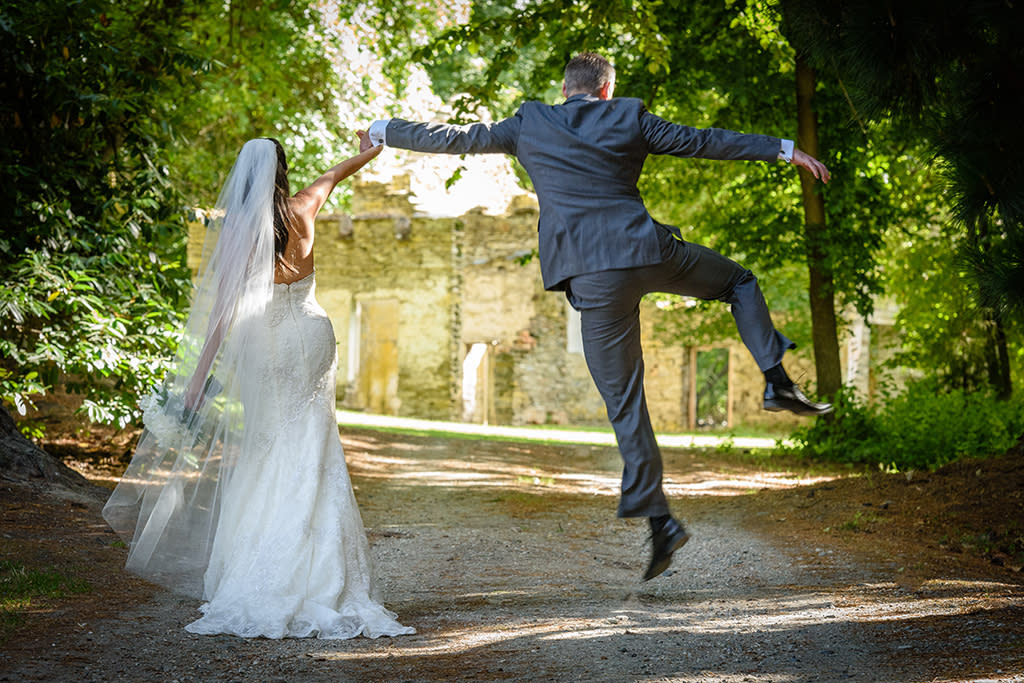5 reasons to ignore the statistics and marry young

I’m glad I didn’t study divorce statistics when I got married at age 22 to my husband, then 23. If I had, I might have been deterred by the sobering numbers: Americans who tie the knot as teens have a whopping 38% risk of divorce, and early 20-somethings a 27% risk. For the best chance of success, the research says, marry between ages 30-34; the divorce risk for those unions is a mere 10%.
Population trends have been moving in this direction: the median age of first marriage is higher than it’s ever been in the US (29.5 for men and 27.4 for women, versus 27.6 and 25.9, respectively, just 10 years ago). I feel a bit outdated, my choices like a relic.
Yet, marrying young worked for me. Here are my top five reasons why, as I experienced them:
1. You can focus on your career.
Finding a life partner requires a lot of time and effort—and hiccups along the way are distracting. By marrying young, I spared myself years of effort and could invest my time in building my professional life (in my case, writing articles, developing recipes, and authoring books). Even better, my husband could help me do so, by providing ideas and feedback.
2. You will be spared heartbreak.
Loss is incredibly painful, as is betrayal. We all know that dating (usually) involves kissing a lot of frogs before finding the right person. By marrying young, you protect yourself from multiple rejections and disappointments (of course this isn’t fool proof). Many of my friends and family members have testified to the pain they experienced—not a worthy trade-off, in their opinions, for the increased dating experiences.
3. You will have a partner to help you navigate adult life.
Your 20s can be a turbulent, challenging time, with money tight and careers still in their beginning stages. Since two minds are better than one, a life partner is such an asset in helping to build the foundations of a strong adult life.
4. You’ll grow into an adult in synch with your partner.
Imagine two branches of a river becoming one larger, stronger body of water. That’s what happens when you commit to a life partner early on. Instead of crystallizing distinct, individual identities and routines, you will forge an adult identity and life in conjunction with your partner. The caveat here is you need to work at growing together, rather than growing apart.
5. You will learn to compromise and share from a young age.
One of the biggest challenges of marriage is accommodating the needs of someone else. By marrying young, you will learn to make concessions and come to agreements earlier on, leading to a more flexible self and a stronger union
All that said, here are a few key disclaimers:
1. Don’t settle.
I am not making a case for marrying young just to marry young. I wed at 22 because I felt my husband was too miraculous to risk losing. We also shared the same values, goals, and long-term aspirations, and respected each other thoroughly. Friends of mine who—in their words—“settled” for their first spouses ending up getting divorced. That said, if you are extremely confident that your partner is the right person for you, I urge you not to let the research or trending population patterns scare you away.
2. Consider waiting to have kids.
My husband and I waited eight years after marrying to have our first child. So, ironically, we ended up becoming parents later than the median ages in the U.S. (currently 29 for men and 26.3 for women). Looking back, having our first child at age 30 (for both of us) was ideal, as that lag provided us several years to continue getting to know each other, travel extensively, work on our careers, and establish a household. When our first son arrived, he entered a stable, adult environment—one that we had spent years creating.
3. Think older when planning your wedding.
Even if you’re 22, try to imagine how you will live in the future when registering for wedding gifts (hint: there’s a good chance you won’t need those crystal flutes or extensive china collections). Similarly, don’t let your parents plan the festivities without your counsel. As best as you can, try to stamp your own identities on your nuptials. You’ll be glad you did, later on.
Read more from Yahoo Lifestyle:
Here’s what it’s like to be the wife of a football player with CTE
Memoir excerpt ‘Surviving Myself’: How Dina Pestonji beat death 4 times before 30
Science says a hot soak can lift your mood — here are 5 bath products to try now
Follow us on Instagram, Facebook, and Twitter for nonstop inspiration delivered fresh to your feed, every day.
